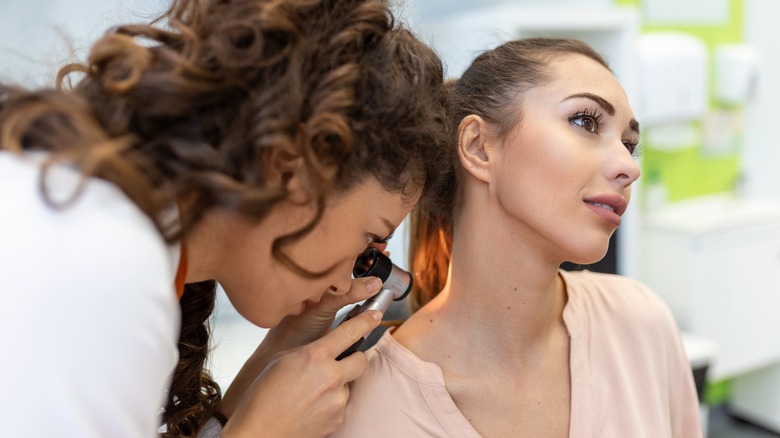What To Expect When You Go To The Dermatologist
There are many reasons you might be thinking about visiting a dermatologist. Maybe you've noticed a new mole or a change in an existing one, you're concerned about hair loss, or you're experiencing persistent acne. No matter the reason, it's important to know what to expect when you go to the dermatologist so that you can be prepared for your appointment.
First and foremost, your dermatologist will want to get to know you and your skin (via Verywell Health). They'll likely ask about your medical history and any medications you're currently taking. Be prepared to answer questions about your diet and lifestyle habits as well. Your dermatologist will also perform a physical examination of your skin, looking for any abnormal growths or changes. They may also recommend one or more diagnostic tests. Based on the information gathered during your appointment, your dermatologist will develop a treatment plan tailored specifically for you. This could involve prescription medication, lifestyle changes, surgery, or some combination of the three.
Why should you visit a dermatologist?
Dermatologists help with many health issues regarding the skin. Some of the most common conditions that dermatologists treat include acne, skin cancer, psoriasis, eczema, and hair loss (via Walk-in Dermatology). They can also treat nail problems, warts, fungal infections, and many more conditions. You should schedule a visit with a dermatologist if you have any of these conditions or any other skin concerns that you would like a professional to look at. After a visit, a dermatologist may request follow-up appointments, prescribe a medication, suggest a lifestyle change, or any combination of those to treat your concerns.
Of course, you don't need a visible skin issue to visit a dermatologist. These professionals can also help with preventative care and help you keep your skin as healthy as possible. They are also trained to skin conditions early, so they may notice a problematic area before you do. Visiting a dermatologist for the first time can feel intimidating, but these doctors are just as important for your health as your primary care physician.


